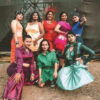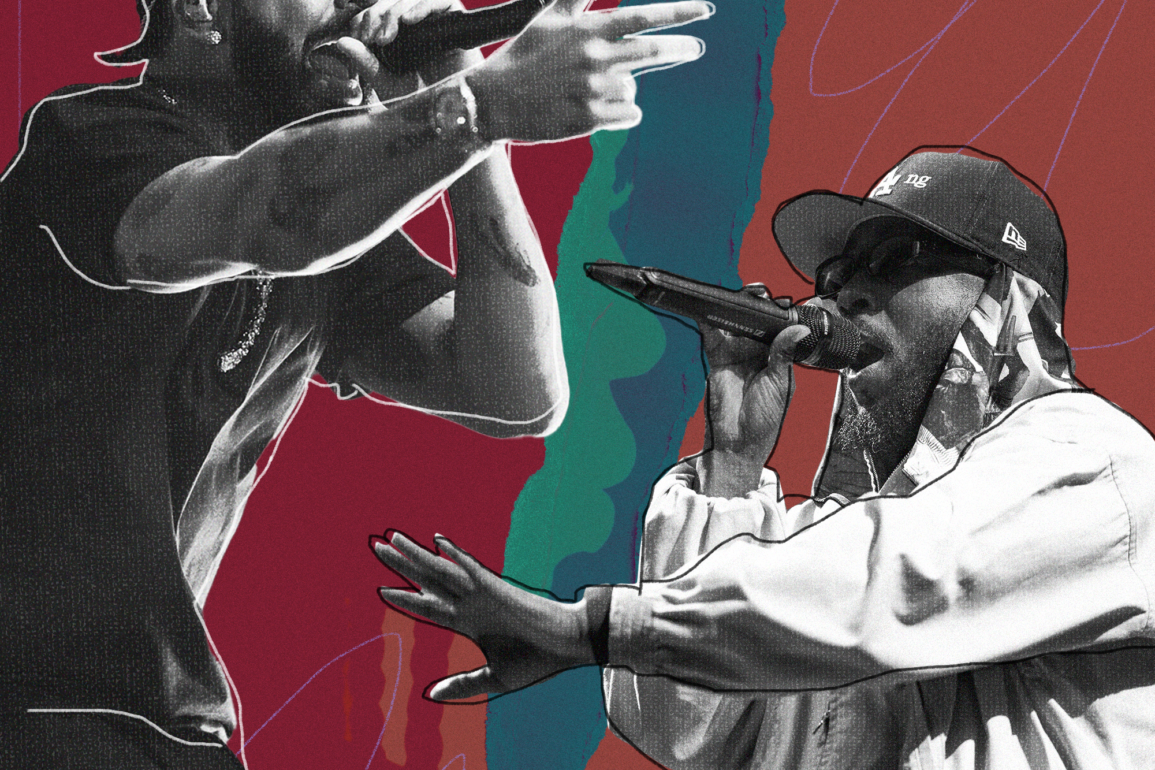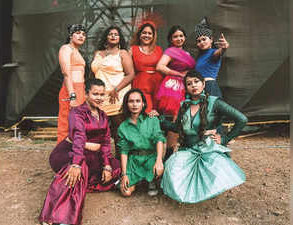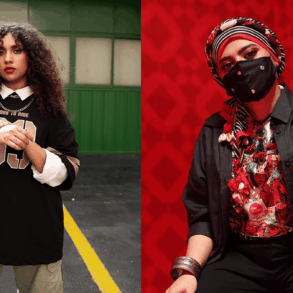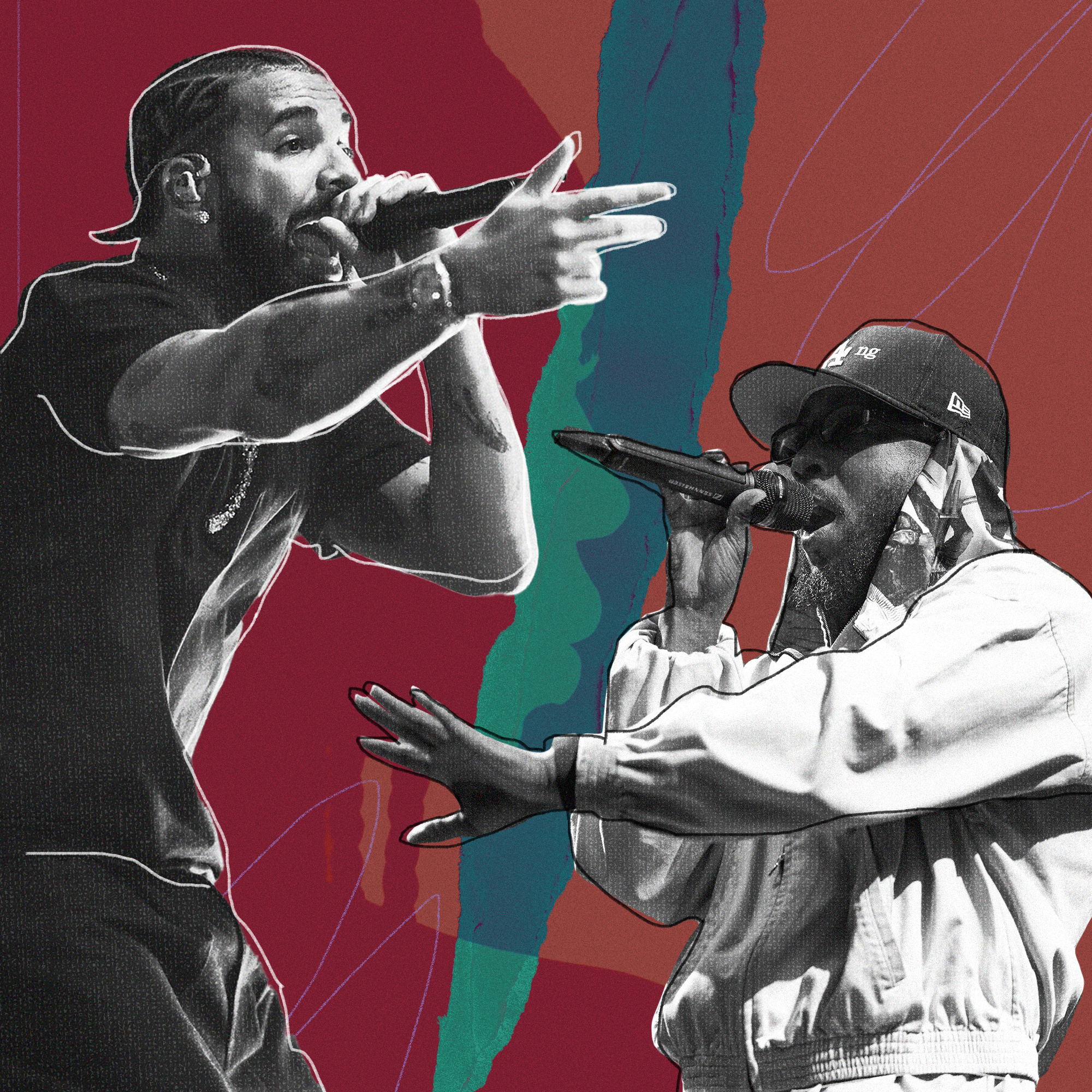
Just when it seemed the talk about the Kendrick Lamar-vs.-Drake beef had finally simmered down following the concert last month that some (me) considered the latter’s funeral, a video for Lamar’s massive hit “Not Like Us” dropped on July Fourth. The Compton native used Independence Day to remind Drake that he isn’t an American, just as Lamar had leveraged his Juneteenth “Ken and Friends” concert in Inglewood to drive home his argument that his opponent isn’t Black in the way that most of his hip-hop peers are.
In one scene from the video, Lamar and his fiancée, Whitney Alford, dance with their small children. The camera makes it look like you’re peering in on the family during a private moment at home, a direct response to Drake allegedly putting money in the street to get dirt on his opponent, something Lamar claimed on “6:16 in LA.” This moment of familial unity flies in the face of Drake’s contention on “Family Matters” that Lamar might not be the father of one of his children and that he abuses Alford.
In 1991, the pioneering hip-hop journalist dream hampton published her first editorial for The Source magazine, then rap’s monthly Bible. In it, she reflects on domestic violence in light of news that Public Enemy rapper Flavor Flav had been arrested for assaulting the mother of his children and that Dr. Dre had brutally assaulted hip-hop journalist Dee Barnes. “It infuriates me that witnesses reported that Dr. Dre’s bodyguard held the crowd back as Dee received multiple blows to her womanhood,” hampton wrote. “I find it intolerable when brothers ask ‘so what did Dee do?’ I will be outraged to learn that Dr. Dre is not underneath the jail when this is published.” (Barnes reportedly filed charges and reached a settlement with Dre, who pleaded no contest. Flavor Flav pleaded guilty to assault and spent 30 days in jail.)
Dr. Dre attacked Barnes, the host of the weekly hip-hop series Pump It Up!, at a Hollywood nightclub after an interview with Ice Cube was featured on her show. Cube had recently departed NWA and was on the outs with Dre and the group’s other members. Dre felt the move disrespected NWA, whom Barnes had interviewed and had a friendly relationship with in the past. In a 2019 interview with Wendy Williams, Barnes claimed that Dre grabbed her by the hair and “slammed” her into a brick wall. She says he then followed her into a bathroom where he continued to assault her, but she chose not to describe what was done to her once the two were out of public view. (In the HBO documentary The Defiant Ones, Dre calls the violent incident “a major blemish on who I am as a man.”)
To my great disappointment, Dre was one of the “friends” Kendrick brought out at the Juneteenth show, performing two of his own hits before doing the “I see dead people” intro to “Not Like Us,” the song that has solidified Drake’s defeat. The irony of Kendrick calling out Drake for mistreating and disrespecting women and then bringing out a known abuser was not lost on me. It was a very on-brand moment for hip-hop.
There may not be other (known) stories of women being physically assaulted over hip-hop beef, but historically, they have been treated as pawns in feuds between influential rappers. The conflict between Drake and Pusha T led to the reveal that Drake had a child with a former adult film star, something Pusha implied Drake was embarrassed by. An affair between Jay-Z and Carmen Bryan, who is the mother of Nas’s daughter, amplified the two rappers’ famed 2001 battle. Tupac Shakur kicks off “Hit ‘Em Up,” one of the most famous diss tracks of all time, by claiming that he had sex with Faith Evans, wife of the Notorious B.I.G. (Evans has denied this); in the same song, Tupac threatens to snatch Lil’ Kim’s “ugly ass off the streets.” When KRS-One’s Boogie Down Productions was warring with the Juice Crew in 1987, BDP rapped that 17-year-old Juice Crew affiliate Roxanne Shante was only good for “steady fucking.”
Considering this history, it’s unsurprising that women are at the center of the (likely over) war of words between Drake and Lamar. However, something unprecedented is happening as a result. Women and girls, and specifically Black women, are being defended by mainstream male rappers for the first time. Lamar’s “Not Like Us,” one of the most popular songs of the moment, calls out the abuse of young girls and women. Not since Tupac’s “Keep Ya Head Up” has a major hip-hop track by a man been concerned with the lives of the demographic that makes up nearly half the genre’s listeners.
It’s hard to celebrate Lamar for calling Drake out for allegedly preying on girls and for hating Black women without considering Drake’s rebuttal: He claims that his opponent abuses his partner and that Lamar’s team suppressed a story about him allegedly assaulting a woman in Vegas in 2014, a claim Lamar has publicly denied. Lamar has emerged as the clear winner of the conflict. His songs “Euphoria” and “Not Like Us” have become hits, the latter topping charts across the world. He is seen as the people’s champion, while Drake is being lampooned as a culture vulture. As such, the allegations against Lamar don’t seem to have concerned most listeners, with many dismissing them as the desperate lies of someone who was outmatched by his lyrical rival.
Admittedly, I’ve thought poorly of Drake for a very long time; his creepy texting relationship with Millie Bobby Brown and footage of him kissing and squeezing a 17-year-old girl on stage when he was 23 only fueled the fire. I got tired of him being positioned as a sensitive lover boy when his music is misogynistic and filled with tales of womanizing. But what truly made him scum in my book was his 2022 “Circo Loco” verse insinuating that Megan Thee Stallion lied about being shot by Tory Lanez, who was convicted in 2020 on three felony counts and sentenced to 10 years in prison for the shooting. Drake would take it further a couple of years later by posting a call to free Lanez from prison—where he is because he did shoot Megan. It galled me that a rapper who has a large female fan base to credit for his success would so openly disregard violence against a woman. For some, I would imagine it also makes his allegations against Lamar less credible.
I’ve been a big Kendrick fan for years. Still, I was disappointed that his last album, Mr. Morale & the Big Steppers, featured Kodak Black, who pleaded guilty to first-degree assault following an incident in a South Carolina hotel room with a teenage girl. (Black was originally charged with rape but accepted the lesser charge in a plea deal.) Lamar’s decision somehow seemed political, as if using a rapper who was made controversial through a sexual assault accusation made a statement. I was also troubled by “We Cry Together,” a track in which Lamar and actor Taylour Paige take on the role of a couple berating each other. He calls Paige a “bitch” 13 times, but while she levels legitimate criticism at him for his behavior, he presents zero receipts on her, just pure vitriol. It ends with the couple having sex. Considering that Lamar has said little about issues between men and women throughout his catalog, it was telling that this was his foray into the conversation.
Though the claims have yet to be substantiated, let’s consider the possibility that both Drake’s and Kendrick’s accusations against each other about abusing women and girls are even somewhat accurate. What does it mean that two of the titans of hip-hop may be engaged in gender violence? In the past, it would have been a non-issue. In addition to beating Barnes, Dre has also been accused of abuse by his ex, singer Michel’le. (In a 2015 Rolling Stone interview, commenting on charges of abuse, Dre said, “I would say all the allegations aren’t true—some of them are. Those are some of the things I would like to take back.” Michel’le said he’s never apologized.) Flavor Flav racked up three other arrests for domestic violence. (He served a three-month jail sentence for shooting at a neighbor in 1993; his other charges were reduced to misdemeanors.) Treach allegedly abused Pepa of Salt-N-Pepa (allegations he’s denied). Fabolous allegedly caused severe damage to his girlfriend’s two front teeth, which she lost. (Fabolous was charged with third-degree aggravated assault and terroristic threats for which he reportedly struck a plea deal.) Lil’ Kim has spoken out about being abused by the Notorious B.I.G. T-Boz accused Mack 10 of spousal abuse in divorce filings (claims he has denied). Nas has been accused of domestic violence by both his ex-wife Kelis (which he has denied) and Carmen Bryan. Tupac went to jail for first-degree sexual abuse. (He apologized to the victim but claimed he’d committed no crime.) Nelly has been accused of sexual assault by three women (accusations he’s denied, though he settled with one accuser after she brought a lawsuit against him for sexual assault and defamation). Tyga allegedly started dating Kylie Jenner when she was 17 and was arrested for domestic violence against his then girlfriend (he’s denied the domestic violence allegations). T.I. and his wife Tiny have been accused of sexual assault and sex trafficking (allegations they’ve denied). Kool G Rap was accused of beating his ex. Lil Uzi Vert pleaded “no contest” to charges of assaulting his then girlfriend and was sentenced to three years of probation. Gucci Mane pleaded guilty to throwing a woman out of a moving car and was sentenced to six months in jail. We saw Quavo flinging Saweetie around that elevator. (He acknowledged the incident but denied abusing her.) XXXtentacion admitted to beating his girlfriend on a secretly recorded tape while awaiting trial on domestic abuse charges, to which he pleaded not guilty. Tekashi 6ix9ine admitted to years of domestic abuse in a cooperation agreement and also pleaded guilty to using a child for a sexual performance. Influencer Ariana “Ari” Fletcher has accused G Herbo, her child’s father, of battering her. (He pleaded guilty to misdemeanor battery.) Rich the Kid’s estranged wife accused him of beating her and forcing her to have abortions (which he denied). DMX was accused of sexual assault (which he denied). Joe Budden was accused of abuse by three ex-girlfriends, including one who claimed she miscarried as a result. (He pleaded guilty to disorderly conduct in one case and denied the other allegations.) A$AP Bari pleaded guilty to sexual assault. The Game’s former longtime partner claims he once broke her nose (which he denied). NBA Youngboy was captured assaulting his girlfriend on surveillance footage and pleaded guilty to misdemeanor simple battery for which he was sentenced to 12 months probation. Long before recent accusations against P Diddy piled up, there were rumors that he’d harmed both Kim Porter and Cassie. (He apologized for his treatment of Cassie after surveillance footage emerged of him assaulting her, but has since deleted the apology.) Singer Justine Skye accused Shek Wes of abusing her (which he denied). Blueface and Chrisean Rock’s violent relationship netted them a Zeus reality show. Playboi Carti allegedly choked the pregnant mother of his child and was charged with aggravated assault (which he has denied). Mystikal was convicted of sexual battery in 2003 and was indicted for first-degree rape two years ago (he pleaded not guilty). Recently, 50 Cent was accused of sexual assault and domestic violence. (He denied the accusations and has sued for defamation.) Soulja Boy has numerous allegations of violence against women, such as holding a girlfriend at gunpoint for hours, for which he was sued and ordered to pay damages, which he has yet to pay. (I’d imagine that some of you are more offended that I included Soulja Boy on a list of hip-hop figures than you are at what these men are accused of.)
As someone who has some connections in the music industry, these aren’t the only stories I’ve heard, these are just the ones that are public knowledge. Also, there isn’t enough space to write about how many rappers have performed lyrics about assaulting women. Eminem dedicated multiple songs to stories of beating and murdering his ex-wife, and she has said that the ridicule nearly drove her to suicide.
Of the rappers I named here, I only listen to Biggie, Tupac, Nas, and Flavor Flav’s Public Enemy on rare occasions. Once a man is accused of gender-based violence, I generally try to disengage from his work. With Biggie and Pac, I rationalize it by them being dead: My infrequent streams are not empowering them to continue allegedly harming women. As far as Public Enemy goes, I don’t want to hold the whole group accountable for Flav’s actions, though that means ignoring the likelihood that his bandmates had a front-row seat to his behavior. Regarding Nas, honestly, I have no excuse, but what generally happens is that I’ll put on his music and start thinking about what he’s been accused of, and then I turn it off.
Meanwhile, I’ve listened to “Euphoria” and “Not Like Us” on an endless loop for weeks. I keep asking myself, Why aren’t the accusations against him enough to make me stop? I don’t have an answer. I’ve long understood that to be a feminist hip-hop fan is to be somewhat of a hypocrite, considering how much of the music is dedicated to bashing women. But by disengaging with artists who were accused of physical crimes against women, I still felt like I was living within my values. Why am I unable to do that here?
To be fair, unlike in the aforementioned accusations, no known victim has publicly said Lamar harmed her.
To much of the public, and perhaps to me, the allegations against Drake are easier to believe than the ones against Lamar. Drake has partied with girls for years, including the Jenner sisters before they were 18. On “Nice for What,” which was celebrated as a pro-woman anthem, he raps, “High school pics / you was even bad then.” As Lamar calls out on “Not Like Us,” Drake associate Baka Not Nice was arrested for sex trafficking; the charges were dropped when the alleged victim refused to testify, but he did plead guilty to and was convicted of assaulting the woman. Conversely, Lamar has a reputation for being a family man. It’s hard to imagine him being at, say, a Diddy party. Plus, he simply outrapped Drake. He’s the clear victor of this war of words, and, thus, nothing Drake has accused him of has seemed to stick as far as his fans are concerned.
In spite of what Lamar was accused of, I’ve giddily followed each moment of this battle, stopping whatever I was doing when a new song dropped. I haven’t been this excited since Barack Obama won. In the past five years, Drake, who once seemed to be the heir apparent to LL Cool J with regards to his fervent female fandom, has shifted from “nice guy” misogyny to attacking Black women and appealing to incels. He’s spent years posturing as a tough guy even though the world knows he was raised in an affluent white suburb in Canada and appeared as a principal character on the teen show Degrassi. Finally, he’s being called out for all of it over a series of highly enjoyable songs.
Part of what’s so gratifying about it for me is that Lamar is talking openly, not just about Drake’s alleged predatory behavior, but about his long unchecked misogyny. On “Euphoria,” arguably one of the best diss records of all time, Lamar spits, “I believe you don’t like women.” On “Not Like Us,” which may have transcended the conversation about biggest diss records, he cautions Drake that he “better not ever speak on Serena [Williams],” a former flame of Drake’s who has also been a target of his anti-woman raps. Lamar also blasts his opponent as a mediocre father to his son and an absentee one to an alleged secret daughter (Drake has denied having a daughter). Short of when rappers talk about their own missing dads, when has hip-hop ever called out a deadbeat within its own ranks?
Drake’s “The Heart Pt. 6” seems to be the last track in this epic battle. On it, he defends himself against the predator accusations, claiming, “If I was fucking young girls, I promise I’d have been arrested / I’m way too famous for this shit you just suggested,” which is preposterous considering R. Kelly, Harvey Weinstein, Bill Cosby, and the recently disgraced Diddy. Drake effectively waves the white flag at the end of the track and it seems unlikely that Lamar will respond with another song.
Many fans would argue that there’s nothing left for Lamar to say. He’s challenged Drake’s Blackness, illustrated how he’s used popular Atlanta artists to give him the street cred that his privileged background lacks, and gotten people across the world dancing to a track that calls him a “certified pedophile.” But while Lamar did charge that Drake would “make up stories on the family front” to attack him, he has not come out directly and stated that he’s never beaten his partner. Maybe it’s just me, but I wanted to hear that. I wanted him to state unequivocally that he would never do such a thing, effectively shaming men who do engage in that behavior. I feel like hip-hop fans needed to hear that.
In hampton’s op-ed, she argued that “Hip-hop music must take responsibility for eliminating the perpetuation of the destruction of the Black community, i.e. the abuse of the Black woman. It has no place in revolutionary music.” What is more apparent today than ever is that hip-hop music is not revolutionary. It’s hyper-capitalistic and violently misogynistic more often than not. Women fans have long had to turn off parts of their brains to enjoy it, convincing ourselves that we are not the “bitches” and “hoes” our favorite rappers are singing about.
You could argue that by making these accusations against Drake, Lamar has made revolutionary music. He’s got people dancing to tracks that call out misogyny and predatory behavior. Not since Queen Latifah’s “U.N.I.T.Y.” has a major hip-hop song taken on sexism in any significant way. Imagine if this set a new standard, if it were no longer cool for rappers to be unabashed about their hatred for women. What if all the creeps in the industry were called out? What if being a mediocre father changed fans’ perception of an MC?
Alas, Lamar is not some hero willing to take on Drake’s tremendous fan base in defending women and children. For years, Kendrick has made it clear that he doesn’t want to be seen as an activist or leader. His primary complaint is that Drake, an outsider, has leveraged African American culture to build a platform he doesn’t deserve, that he has postured as something he is not. If Lamar were in the business of speaking up for women, we would have heard him do it throughout his illustrious 15-year career. Yet, considering how often sexism and abusive behavior go unchecked, it’s incredibly refreshing to hear someone dissed for them.
Perhaps it’s Drake’s own history of behavior that makes his claims of abuse against Lamar ring hollow. It could be the lack of evidence. When it comes to supporting potentially abusive men, maybe I’m just as complicit as I’ve accused others of being. It’s horrific to imagine the possibility that Drake’s claims are real, but the world has decided we like Lamar too much to consider them. Consider what it may mean for an abuse victim to have to watch that play out.
Where do we go from here? Does Drake survive being called a predator? Do fans who danced to “Trying to strike a chord and it’s probably A-minorrrrr” go back to listening to him as if everything is okay? Will Universal Music Group and the various brands who work with Drake feel comfortable being represented by someone accused of such heinous things? The masses have already forgotten the allegations of violence against Lamar. Still, in a season where we’ve seen the undoing of Diddy, it’s much more unclear what comes next for the guy who made a name for himself crooning “sensitive” tunes aimed at women and then rebranded as an emotionally stunted misogynist. In the meantime, I’ll continue to enjoy what seems to be Drake’s undoing, all the while hoping that my hero’s own hands are clean.
And you know what? To some extent, I know they aren’t because he leveraged devastating allegations regarding misogyny and the abuse of young girls to win a rap battle. If Drake didn’t piss Lamar off so badly for doing Black American cosplay, he would have went on knowing that this dude was a creep and a woman hater, and he wouldn’t have said a word to anyone! Yet, I’m still celebrating K.Dot’s words. A win is a win, wherever we can get one. If nothing else, people across the world are largely unified around the fact that preying on young girls is gross; we did not have a similar consensus regarding R. Kelly for many years. Perhaps this moment in history will convince some girls that there’s nothing flattering about the attention of a grown man, and, more urgently, maybe it will bring some shame upon guys who take advantage of underage and/or barely legal girls. If predation wasn’t still somewhat socially acceptable, it wouldn’t be so common. Wop, wop, wop, wop, wop, Dot f-cked him up. I just hope I’m doing the right thing by cheering for him.
More Great Stories From Vanity Fair
This post was originally published on this site be sure to check out more of their content.


